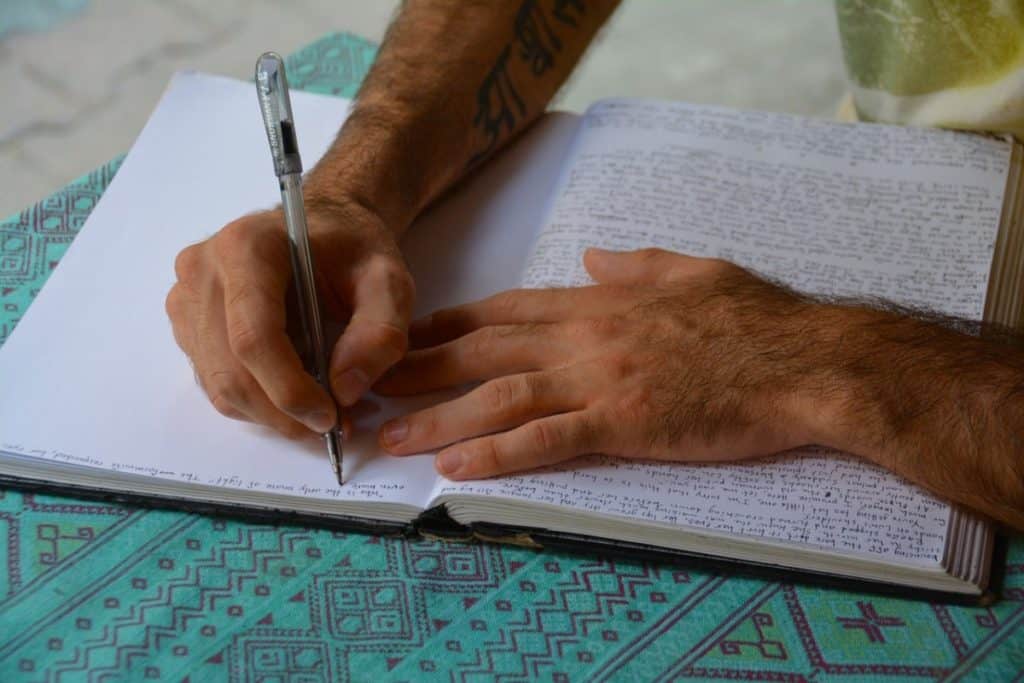Recently I’ve been struggling with a big emotional decision and change in my life – my 9-month old son starting childcare. For the last several months I’ve been trying to juggle our business and looking after him, but now I need to start working a bit more, so he’s going to start spending a couple of days a week with a childminder. Sounds logical, right? But my goodness it has involved a LOT of emotions, and I’ve found myself in a total dilemma about what to do.
When life throws you these big emotional decisions, it can feel really overwhelming and exhausting. Emotionally you fret over what to do, your heart says one thing and your head says another. It weighs on your mind, and makes you feel distracted and tired. Maybe you’re changing career, leaving a relationship, or your kids are flying the nest; whatever you’re facing right now, we all go through these big moments in life which are full of emotion and can feel really hard.
I am certainly no expert, but I did spend a lot of time thinking about this dilemma, and how to come to the right decision. So, I thought I’d share some of the things I’ve been doing that have helped me, and whatever you’re facing in your life, I hope that they help you too.
1.Journalling
Whenever I felt myself getting upset about the decision and unsure what to do, I’d reach for my journal and write down how I was feeling. Writing is SO helpful in situations where you feel in a dilemma, because you can find a bit more objectivity when the words are written down on the page. Otherwise, you end up walking around with all your thoughts swirling around in your head, and it’s very difficult to find any clarity or reason behind your emotions.
The more that you can get your thoughts out of your head and down on paper, the more space you create in your head to think about a solution. Otherwise, you can’t get beyond the problem, it consumes your thoughts.

Not sure where to start with journalling? Write down how you feel, what’s going on, what are you finding hard, why are you finding it hard? Describe the situation you’re in. How does it make you feel? What’s making you feel tearful? I also wrote out a list of pros and a list of cons. This really helped to detach from the emotion for a minute and to focus on the logical facts.
2. Looking Inwards, Not Outwards
What do I mean? Well, when you are faced with a problem or dilemma, it’s natural to look outwards to other people who are facing a similar situation, and to be led by what they are doing. But the problem with this is that everyone is doing something different. It just depends who you’re looking at!
In my case, I could either look at people who are stay at home mums and beat myself up for even considering childcare. OR I could look at friends who have children who go to nursery full time. Who was I going to look to for the answer?
Looking outwards isn’t always helpful because it makes you look at what everyone else is doing, instead of focusing on what YOU need to do, and what’s right for you.
Once I stopped looking outwards and instead looked inwards and really thought about what was going to work best for me, my family and my life, it made the decision much easier.
But of course it’s not that simple. Being able to look INWARDS means you need to be confident in your own skin, and you have to be ok with doing things differently to other people. The solution that works for them might not work for you.
Be ready for other people to have opinions about your decision – that’s ok, let them. Do what’s right for you. This is not always easy, but an essential skill to learn in life.
3. Zoom Out!
When we’re faced with a problem in life, we tend to REALLY focus on that problem. It’s all we can think about, and we churn over our thoughts and feelings about it again and again in our heads. In my case, all I kept playing on repeat in my head was HOW CAN I POSSIBLY LEAVE MY SON WITH A CHILDMINDER?
We tend to lose perspective when we do this, and we aren’t looking at the bigger picture or the whole situation. We just focus on one aspect of it.
I found that by zooming out and looking at the problem in the context of my life as a whole, it helped to find a solution that felt right for me.
For example, instead of obsessing over how it made me feel, I needed to start asking myself other questions – what do I want my life to look like, including work, leisure and family time? What are my goals, how do I want to spend my time? What’s best for the whole family, financially, practically, emotionally? This helped me to frame the decision in a much wider context, rather than focusing purely on my emotions.

Walking always helps me to get some perspective… even under stormy skies!
4.Don’t make a spur of the moment decision!
Sometimes we can get so emotional about something that we make a snap decision in the heat of the moment. We desperately don’t want to feel that upset or unhappy, and we let this emotion drive the decision.
I found that this wasn’t helpful, it meant I was making decisions purely driven by my upset, not by logical reason.
Instead, in these moments (when if you’re like me, you can’t stop crying and feel emotionally exhausted), try this:
-Recognise this is a wave of emotion – and like a wave, it will come in and then go out. Ride the wave, and let the emotion in – crying is always helpful, and it’s important to feel how you feel. Don’t try to stop it, just go with it. Trust that it will pass.
-Don’t make a decision when you’re riding this emotional wave
-Instead, get out some paper and write down how you’re feeling, or go for a long walk to clear your head, try meditating or sitting quietly with your thoughts.
Once you have let your emotions settle, often you’ll realise that the spur of the moment decision you were going to make wouldn’t have been the right thing to do.
It’s really important to understand that emotions are normal and healthy. This isn’t about trying to pretend that emotions don’t exist, it’s about recognising them, and letting them be there.
It’s ALWAYS better to make decisions with a calm, steady, cool and logical head. If you’re feeling highly emotional, let the emotions come and then settle BEFORE you make any big decisions.
“I am in control, not my emotions”
Ryan Holiday
5. Apply logic and reason
It’s not easy when you feel emotionally drained by something to start being logical. All I wanted to do was to wallow in my tears and hope the problem would go away. But it never does, until you face it.
Can you defy your emotional reactions with logic and reason? It’s helpful to do this by writing down your thoughts and feelings, and then asking yourself lots of questions to get to the TRUE answers. In the words of Ryan Holiday, see things for what they truly are, not what you’ve made them in your mind.
I found writing down some of my feelings and then questioning them with reason was really helpful, because it helps you get to the true underlying cause or reason.
For example, I would write down how hard I was finding the idea of leaving my son. But I’d also written down that I wanted him to be independent, resilient and confident in any situation. There was an obvious contradiction here -how could I expect him to become independent if I wasn’t going to leave him and give him the chance to develop this skill!? I’d made the idea of leaving him into something so negative, I wasn’t seeing the other side of the coin.
6. What am I choosing NOT to see right now?
I learnt this from Ryan Holiday, and it really stuck with me. Often when we are feeling emotional about a situation, our perspective becomes very narrow. All we can see is the thing that’s making us upset. All I kept picturing in my head was an emotional parting as I handed my son over to the childminder!
By focusing all my thoughts and energy on how difficult I was finding it emotionally to imagine leaving my son, I wasn’t seeing any of the following:
How much fun he would have, the other kids he could play with all day, the new experiences he would have, or how much we’d value time together on the days he didn’t go to childcare.
What are you choosing not to see?
This is a powerful question to ask yourself, so I urge you to sit with it for a while.
7. What story are you telling yourself? Can you tell yourself a different story?
In my case I was telling myself that it would be better for my son if he was with me all the time, instead of being with a childminder.
Ask yourself, is that really true? What other story could I tell myself?
Instead, I COULD choose to tell myself that by having some childcare help, I could work, which would help our family financially, plus time away from me would give my son lots of confidence and new experiences. Also, it would be better for him to have fun playing with other children, rather than being with me while I was distracted from him because I was also trying to work at the same time. Instead, if he spent time at childcare, I could work with focus, and then when I pick him up I can properly focus on him and we can have quality time together.
When you start asking yourself what other story you could tell yourself it opens up the possibility of looking at the problem in a new light.
You start to realise how many of your thoughts aren’t truths, they are just thoughts. You can choose to have new thoughts that tell yourself a happier, more peaceful story than the (often) punishing thoughts we choose to tell ourselves.
8. Preparation is key
If you have to do something that you know is going to trigger you emotionally, it can be useful to think about it in advance, and prepare for it as much as you can.
I knew that when it came to dropping my son off with a childminder, I didn’t want him to see me cry, and I wanted to show him that I was happy, confident and calm about it. Otherwise, how could I expect him to feel those things?
So I spent time thinking about what I could do to keep my emotions in check. How could I ensure this was a calm, positive experience? I journalled about it, and I imagined running and skipping along the road making my son giggle on the way. I decided I would give him a big hug, kiss and smile and tell him I was excited to see him in a few hours.
And guess what? It worked. I didn’t cry, and he saw that Mummy was calm, and confident, so he felt ok about it too.
What have you got to do that is going to trigger you emotionally? How do you want to handle it? The key is in visualising it in advance, and thinking about how you want to conduct yourself in the moment.
Journalling, deep breaths, playing joyful music, and realising that this is just one moment, it will soon pass are all helpful strategies. What will you do to control your emotions when you need to?

Getting outside in nature is a great way to think through any problem you’re facing.
9.Can you take YOU out of the problem? What advice would you give to a friend?
When a friend comes to us with a problem, we often find it easy to come up with a solution. But when it’s our own problem, it’s much harder. It’s easy to be objective when it doesn’t involve you.
So, take yourself out of the problem/ dilemma. What would you tell a friend who was in this situation?
So, next time you face a dilemma…
Take a deep breath, ride those emotional waves, walk, journal, try to detach from your emotions, and see the situation for what it really is.
And if you have someone close to you that can give you a hug while you are riding those emotional waves, all the better.
Good Luck!
PS And if you can do even one of these things next time you are faced with a big emotional decision or dilemma, WELLDONE! This is FAR from easy to do when you’re in the middle of emotional turmoil.
Most people live their lives reacting to their emotions, making spur of the moment decisions and not getting to the root cause of their thoughts. So, if you’re even beginning to try to approach decisions differently, I salute you!
And when those tears flow, remember, this too shall pass.
